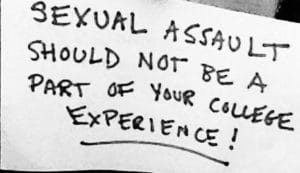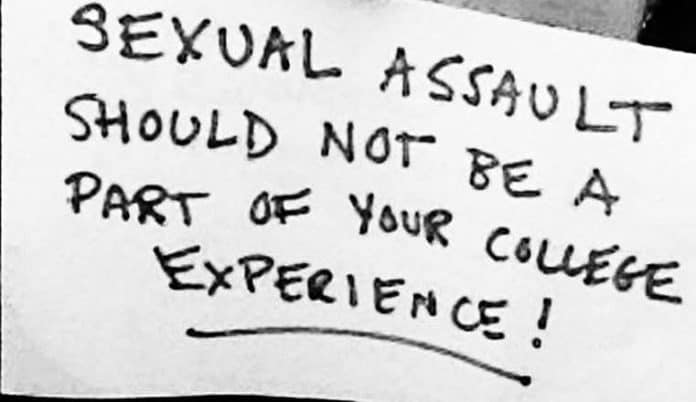 It used to be the one place you absolutely knew your daughter or granddaughter had to go. And you couldn’t wait for the day when you would tearfully, but happily, send them off to an exciting new world of self-discovery, personal revelation and academic growth.
It used to be the one place you absolutely knew your daughter or granddaughter had to go. And you couldn’t wait for the day when you would tearfully, but happily, send them off to an exciting new world of self-discovery, personal revelation and academic growth.
Today, that place has come to be a place where 1 out of every 5 women will be assaulted and little will ever be done about it. Welcome to college.
College rape has been around for a very long time, but curiously hasn’t gotten the attention it really deserves. As far as I know, no woman in my family was ever sexually assaulted, but the great qualifier, of course, is “as far as I know.” During my four years of college at a large mid-western university, I never heard of even one instance of sexual assault on campus– or off-campus for that matter. Not one. And I was in a position of student leadership.
It may be that things just got worse over the last 30 years or so, but now that the issue has come forward on the stage of national attention, it’s hard, looking back, to believe it wasn’t happening then.
Even today, instead of acknowledging the true level of its severity , too many are still ready to simply dismiss it as not really being that bad or by labeling the people who aggressively fight against it as “.”
When our sons are involved, we have this tendency to push back at the suggestion of sexual assault. It’s understandable to some extent– we all want to make sure our sons and brothers (and fathers) are not being sentenced to the hellishness of prison as a result of vindictiveness, anger or spite. In this context the discussion of rape is easily derailed and replaced with a conversation about whether the act should be labelled rape, at all. Suddenly sexual assault has to be redefined:. We’ve all heard the disingenuous questioning:
If a woman doesn’t scream or fight back, is it really rape? What if she voluntarily submits out of fear? What if her attacker had no weapon? What if she was flirting with him first? Was it really rape? Having to redefine and differentiate activity that sounds like sexual assault, but doesn’t quite meet the “standard” definition of forcible rape, is a major reason the discussion often gets bogged down– and why our wives and daughters continue to suffer.
Add to the discussion the characterization of the alleged perpetrators as “good boys” who come from “good families,” and the chatter of distraction deepens– as though good boys never do bad things. Or bad things like that happen only to bad girls who must have done something to cause the good boy to act outside himself. We’ve justified the sowing of oats for so long that a subculture has grown up in our midst that makes it okay for men to sexually mistreat and assault the women of our society, who are in fact their mothers, sisters and daughters.
Well, things may be about to change. A new study by Brown University, published in the Journal of Adolescent Health has eliminated all this “chatter of distraction” by focusing in on assaults that fit the traditional definition of rape where physical force was used, or where the victim was incapacitated due to alcohol or drugs. The study makes it hard for critics to argue that what was studied “wasn’t really rape.”
Guess what? The results are the same: nearly 1 in 5 college freshman surveyed were the victim of a completed or attempted rape their first year in school.
The university studied was not named (no, it wasn’t Brown), but according to the study, some 15% of freshmen women said they experienced a rape or attempted rape while incapacitated (drank too much, were slipped a date rape drug, etc.), and 9% said they had either been forcibly raped or experienced an attempted forcible rape. Allowing for some overlap between the two groups, 18.6%– which is to me a completely unacceptable number– told researchers that by the end of their freshman year they had either been raped or experienced an attempted rape. Welcome to college.
If that statistic doesn’t bother you, maybe this will: when women in their sophomore year at college were asked to go back to the age of 14, that percentage figure more than doubled, to 37%. That’s 1 out of every 3. So if your daughter is a sophomore at college and you’re smilingly enjoying her having a good time with two of her college friends, just know that statistically one of them has been sexually assaulted, and has likely not told anyone.
One reason she might not tell is because she may have been partying with her friends and drank too much. But being drunk is not an invitation to being raped, no matter how much some like to suggest it is – and the rest of us ought to get with the program, because a rapist who has locked eyes on your daughter will often use alcohol as his weapon of choice. He knows she’s likely to blame herself for drinking too much and not tell a soul about it. Not even you. Especially not you.
At 37%– or even 18%– rape is a really big problem. Do women sometimes lie about rape? Yes, it happens. And yes the life of an innocent man accused of rape can be destroyed by the allegation. But you don’t throw the baby out with the bath water. This situation is too serious to be given short shrift. Greater attention must be given to stopping the epidemic of rape on college campuses– but not without due regard to the possibility of harm being done to an innocent accused.
Sexual assault is admittedly a different “kind” of crime. You cannot convict a defendant of murder unless someone has actually been killed. You cannot convict someone of robbing a bank unless a bank has actually been robbed. I also have sons, and I wouldn’t want the mere accusation of sexual assault to ruin a promising future unless a sexual assault has actually taken place– an assault that in some cases is based solely on the victim’s word. Anger, misunderstanding, or vindictiveness alone should never be the reason anyone is sentenced to time in prison.
Maybe the answer lies in the process of reporting. Just as the names of rape victims are not reported, perhaps the names of the accused should not be reported either– at least until a judge or jury convicts. This is not a suggestion that we enact a new law– people charged with other serious crimes would then ask for similar treatment, but it could be done as a matter of policy by media organizations.
Our daughters granddaughters deserve to be protected, and to know that our collective best thoughts have been brought to bear on this difficult and troublesome issue.



